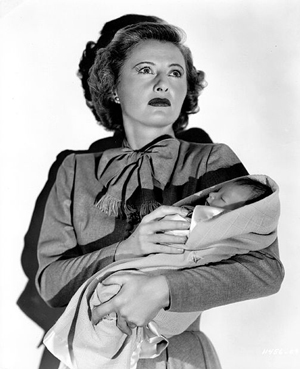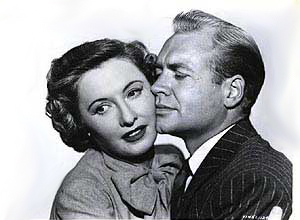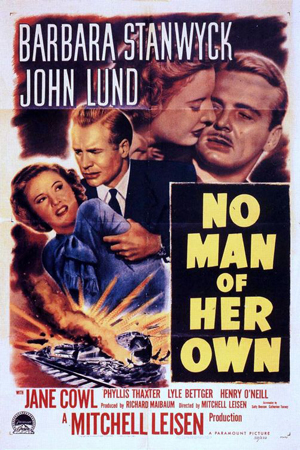
 |
|
|
|
UCLA colleague David Chierichetti was right -- every Mitchell Leisen film I catch up with turns out to be a superior piece of work and a great entertainment. 1950's No Man of Her Own isn't usually listed as a film noir even though its construction and visuals very strongly follow the form of that still misunderstood American film style. In this case director Leisen and producer Richard Maibaum have merged a twisted murder thriller with a sentimental story about an unwed mother. The result satisfies on both counts. 
We aren't surprised to learn that No Man of Her Own was adapted from a story by noir stalwart Cornell Woolrich. Pregnant and desperate Helen Ferguson (Barbara Stanwyck) is abandoned by her no-good lover Steve Morley (Lyle Bettger), a cheap crook who has already taken up with a new woman, Irma (Carole Mathews). All Helen has is a train ticket, and on board she meets a lovely young married couple, Patrice and Hugh Harkness (Phyllis Thaxter & Richard Denning). Patrice is pregnant under completely different circumstances -- Hugh is taking Patrice home to his wealthy family, who have never met her. A horrible accident occurs, and when Helen wakes up she discovers that she is one of the few survivors from the train -- and that the authorities, the hospital and the Harkness family all assume that she is Patrice. Welcomed into her new family, Helen nearly bolts for the exit a half-dozen times. Not only does the family accept her, the mistaken identity means that her baby will have a good life. Not only that, but Hugh's brother Bill Harkness (John Lund) takes a romantic interest in Helen. Life is like a dream ... until the venal Steve Morley comes back and threatens to spoil everything. Surely, ridding the world of the verminous Morley isn't such a bad idea. No Man of Her Own combines the best of what classic Hollywood filmmaking could come up with, and a tougher post-war sensibility. Before the Production Code many movies approached the problems of unwed mothers, but with the 1934 enforcement they mostly disappeared from the screen. Even by 1950 the sight of the unwashed Barbara Stanwyck collapsing in tears while her boyfriend ignores her behind a locked door, was very touchy subject matter. Stanwyck's Helen is on a train to nowhere when a classic noir double twist occurs, yet the writing and acting are so good that we buy events that really ought to strain credibility to the breaking point. Hiding within this tale is an interesting picture of the disparity of fortune in human society. Helen is on her way to nowhere. All she can expect in the way of attention is stern disapproval for her illicit behavior, and probably the loss of her baby to the social authorities. One (admittedly wildly far-fetched) substitution later, and she's the pampered new member of a gracious family. In true "women's picture" fashion, Helen matches kindness with kindness, and emotionally adopts her new life -- it's as if she's been reborn. But we know that that rat Morely won't be away for long, if only because actor Lyle Bettger played so many unregenerate rats. No Man of Her Own generates a strong charge of menace. 
MItchell Leisen shows himself to be a fine director of suspense. He and Stanwyck play a little joke on Billy Wilder when Helen's car refuses to start at the scene of a murder, reminding us of Double Indemnity. Helen's many goofs when pretending to be Patrice -- like using her original name -- are dismissed as the effects of her accident. We are more likely to be distracted by statements that date the movie: recovering in the hospital, Helen/Patrice is told that if she's good, she'll be able to see her baby ... in a week. No Man of Her Own has some of the charm of Leisen's Remember the Night, albeit without the comedy. What we come away with is a real appreciation of Barbara Stanwyk's talent. She was one of Hollywood's highest paid stars and worth every penny -- whether a maudlin weepie or an ice-cold murder story, most everything she was in became a hit. When lesser noir pictures fail, it's often because the actors can't put across the absurd plot contrivances. Stanwyck makes the most unlikely situations entirely believable; she gathers audience interest and sympathy like a sponge. The movie is also a showcase for the talented John Lund, a guy with a Clark Gable voice who seemingly didn't get the right breaks, even though he shows up in now-appreciated classics like A Foreign Affair. No Man of Her Own is doubly involving because the story doesn't ask its characters to behave like idiots; Lund's Bill never loses his head. He remains loyal to Helen, even when he discovers her secret. The Production Code seems to have been thoroughly confused by No Man of Her Own. The curious wind-up doesn't quite follow the "pay for your sins" rule but does hew to an invisible line of class-conscious retribution. (link to spoiler footnote). 1 The good news is that the ending works, even if it veers away from noir principles. Jane Cowl is endearing as Bill's sickly mother. Former MGM contractee Phyllis Thaxter is highly effective as the original Patrice, making a strong impression of generosity in just a couple of scenes. Thaxter gets a high billing, but young Richard Denning gets the thankless part as the unlucky Hugh, and the low billing that goes with it. This is one of Lyle Bettger's slimiest bad guy performances. Steve forces Helen to marry him in the middle of the night. Misinterpreting her request not to return to the Harkness house, he has the nerve to tell her to forget about sleeping with him, as he's only in it for the money! 
Look fast and you'll see the beloved Kathleen Freeman as a country club guest and the little-known Kasey Rogers at the christening of Helen's baby. As "Laura Elliott" Rogers became one of Alfred Hitchcock's most celebrated murder victims. Warners didn't promote what should have been a Best Supporting Actress candidate because she was borrowed from Paramount. I'm told that the film was remade in 1996 as Mrs. Winterbourne. Olive Films' DVD of No Man of Her Own is an excellent transfer of this richly photographed B&W show. Future West Side Story cinematographer Daniel L. Fapp shows terrific noir chops behind the camera. There are no extras. I'd never seen this thriller and am happy to have finally found it. Olive Films is broadening its slate of interesting Paramount features. Just announced are DVDs of Joseph Losey's searing The Lawless and John Cassavetes' story of a conflicted jazz bandleader, Too Late Blues. Both pictures are rarely seen anywhere, and highly recommended.
On a scale of Excellent, Good, Fair, and Poor,
No Man of Her Own rates:
Footnotes:
1. (Spoilers:) Our leading characters commit plenty of felonies "after the fact" but the cops will probably look the other way because they have a confessed killer in custody, and a powerless "nobody" to boot. No Man of Her Own tells us that there is no difference between the wealthy Patrice and the unlucky Helen, but draws the line between Helen and Irma. I suppose Helen is a "person of quality" who just happened to fall into a bind that turned her into a social outlaw (= unwed mother). But we're meant to assume that Irma is rotten to the core, just like Steve Morley. Nobody's going to lose sleep over her fate.
Reviews on the Savant main site have additional credits information and are often updated and annotated with reader input and graphics. Also, don't forget the 2011 Savant Wish List. T'was Ever Thus.
Review Staff | About DVD Talk | Newsletter Subscribe | Join DVD Talk Forum |
| ||||||||||||||||||